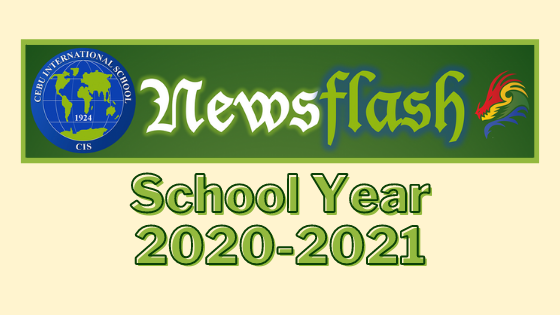
PTA Announcement
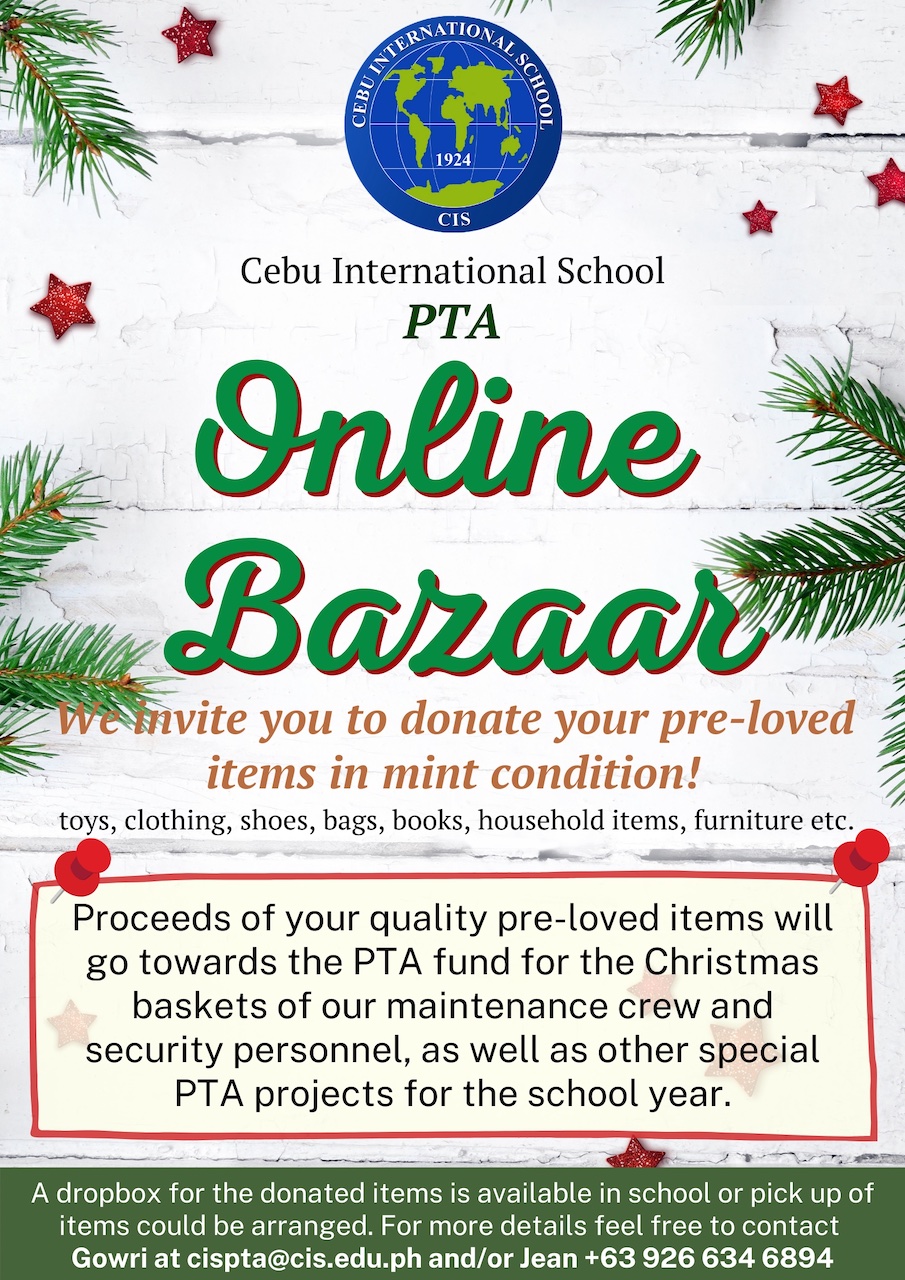
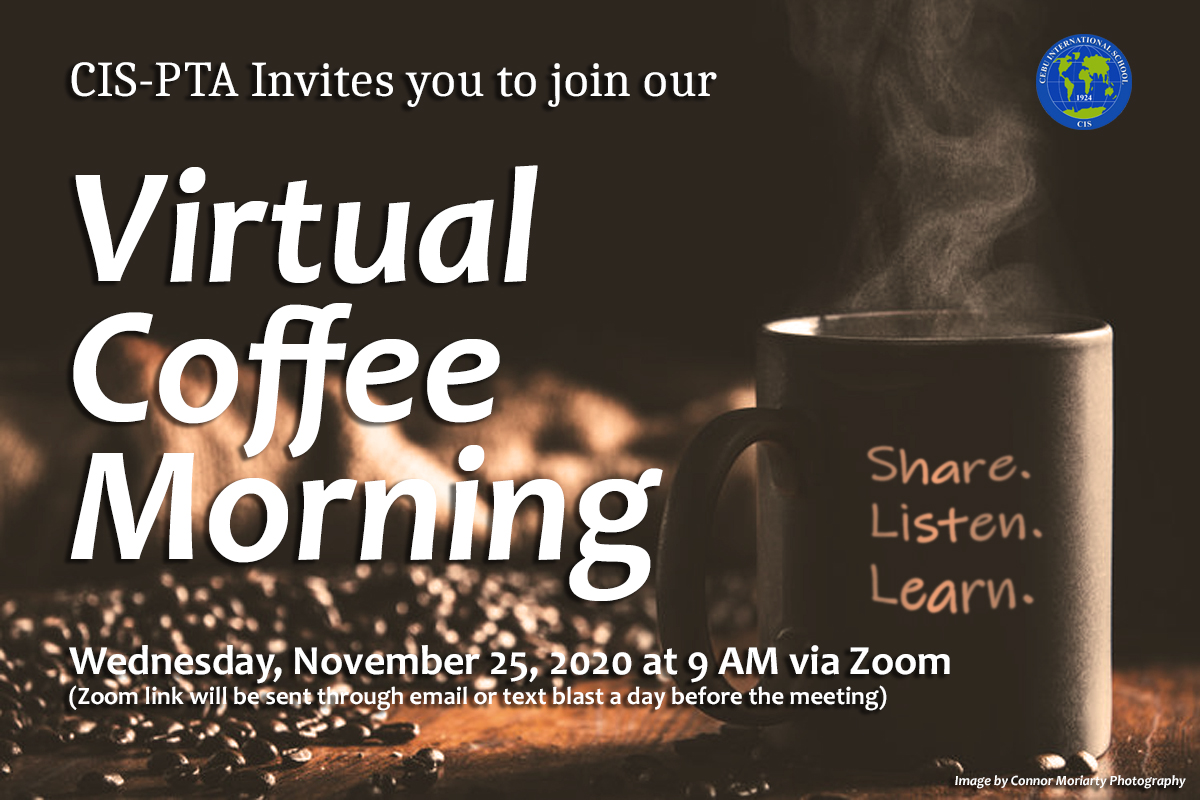
Elementary News
by Mr. Glenn Davies, Elementary School Principal
Dear Elementary Community,
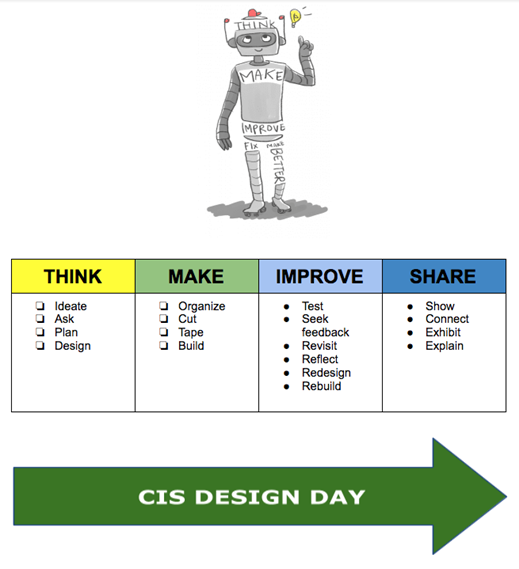 Today your child will have taken part in the first of our CIS Elementary Design Days. It has been an exciting journey bringing this together with the Design Day Team. Several weeks ago one of our elementary teachers raised the idea of a day that was based around STEAM (Science, Technology, Engineering, Art & Mathematics), so in response to this several teachers came together to develop this idea further. The key elements of the day were to teach the student a design process that would help them to become problem finders as well as problem solvers, enabling them to become increasingly familiar with the United Nations Sustainable Development Goals, and to provide a different kind of learning experience to the regular remote learning day. We are excited to see how engaged the students have been throughout this day and as always, we would value any feedback you have for us from your perspective at home that may enable us to improve this experience for your children and yourself.
Today your child will have taken part in the first of our CIS Elementary Design Days. It has been an exciting journey bringing this together with the Design Day Team. Several weeks ago one of our elementary teachers raised the idea of a day that was based around STEAM (Science, Technology, Engineering, Art & Mathematics), so in response to this several teachers came together to develop this idea further. The key elements of the day were to teach the student a design process that would help them to become problem finders as well as problem solvers, enabling them to become increasingly familiar with the United Nations Sustainable Development Goals, and to provide a different kind of learning experience to the regular remote learning day. We are excited to see how engaged the students have been throughout this day and as always, we would value any feedback you have for us from your perspective at home that may enable us to improve this experience for your children and yourself.
This week we are excited to share with you the learning that has been taking place in Music across the elementary school, and in the Eagles KG/G1 class.
Learning in Elementary Music
Early Years
Early years students are continuing to explore how animals move and sound by singing fun songs, playing musical games, and responding to listening provocations.

Grade 2 and Grade 3
Grade 2 and 3 students continued to explore how we can change music through the lens of “the elements of music”. They have also started investigating composing and notating rhythms, focusing on 4/4 time signature and crotchets and quavers.

Kinder and Grade1
Kinder and Grade 1 students have been furiously making final preparations for their home concert. They have been practicing for their performance; organizing costumes; making posters and tickets and decorating their performance venues.
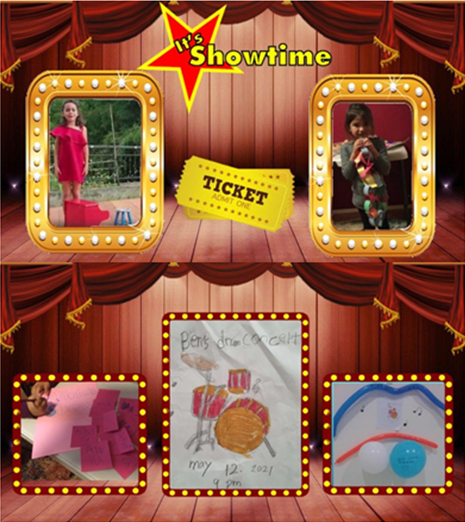
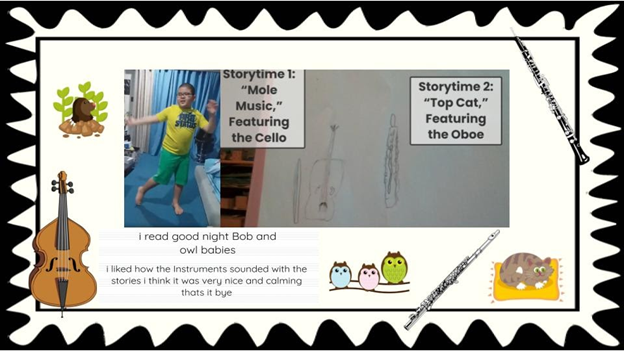
Learning in KG/G1 Eagles
Sharing the Planet
This week, the Kinder and Grade 1 students started a new unit of inquiry, “Sharing the Planet”, with the central idea: People can change their environment through their actions. Previously we read a book called “And the People Stayed Home” by Kitty O’Meara. This book encourages us to look within, listen deeply, and connect with ourselves and the earth in order to heal.
Here are some book responses from our students:
What were some of the changes that happened while people stayed at home?
The earth began to heal. The people listened to each other more deeply. – Erin
The people began to live differently. – Ben
The people made good choices by planting trees and not killing animals. They also meditated. – Catherine
In what ways did the people create new ways to live?
Some of them began to plant trees. – Erin
The people look closely and listen deeply to what earth was trying to say. Ben
The people prayed and stayed home then the earth began to heal. – Masa
People meditated and prayed. Some people also read stories and listened more deeply. – Catherine
They are now working on creating solutions on how we could keep the Earth healthy. Our students are drafting plans for their own inventions- a clean up machine.
Grade 4 and Grade 5
Grade 4 and 5 students have been exploring a number of musical genres such as orchestral music, popular music, and holiday music. They have learned songs using a variety of instruments and sound sources, which include band instruments, body percussion, recorder, and voice.
Middle and High School News
by Mr. Dale Wood, Middle and High School Principal
A few weeks ago, Mr. Davies and I co-led the monthly Parent Coffee wherein we revisited our journey as a school from the beginning of our remote learning period on March 16th to the present. It has been quite a journey, indeed, and while it may seem like this has been one long and monotonous stretch, there have been several significant milestones along the way which we highlighted in the Parent Coffee meeting, moments where the school made significant adjustments to our approaches to remote learning in order to better meet the academic and social/emotional needs of our students.
Even prior to lockdown we had “rehearsed” remote learning days, setting aside one day per year to practice as a community in the event of such an eventuality as the one we are experiencing that might result in school closure. Once the lock down began, our teachers engaged in courses, webinars, and other forms of professional development to enhance their understanding of effective remote learning, as well as enhance their technology skills, skills that would enable them to maximize their effectiveness and impact student learning more powerfully during remote learning. These efforts intensified over the summer as our teachers remained in Cebu and had the time to engage in professional development. The administrative team was likewise quite busy learning about important aspects of how to improve the learning experience for our students in our remote learning context.
At the start of the school year we reviewed our instructional practices and worked together as a faculty to understand, embrace, and incorporate the 5 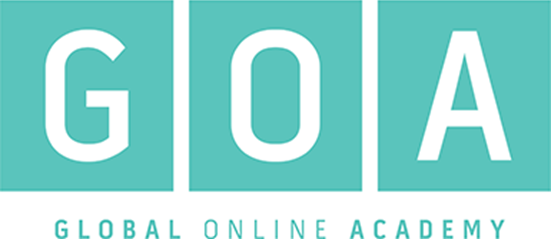 GOA (Global Online Academy) Online Learning Norms. These five norms are:
GOA (Global Online Academy) Online Learning Norms. These five norms are:
- Build Trust
- Challenge Students
- Redefine Time
- Support Student Agency
- Diversify Interactions
In our faculty meetings at the start of the year the respective sections of the school (ES, MS, and HS) reviewed our RL practices and evaluated the extent to which they aligned with these Five Norms; we also identified areas where we needed to strengthen our practice in light of these norms. In all three areas of the school, we added components to our daily instructional approaches with the help of this new set of lenses.
While there would be too much to share if we tried to address all five GOA norms at once, I would like to explore the first two norms and explain how these have impacted our approach and learning in our Middle and High classes during this RL period.
The first GOA Norm- Building Trust
Most would agree that trust is the foundation for any healthy relationship, and this is true for our school community as well. There really does need to be a high degree of trust between all of our CIS members- parents, school, and students- in order for us to have a strong and healthy culture. In the classroom, the trust between teachers and students is pivotal. Teachers need to cultivate within their students a confidence that they are trustworthy and reliable. Students must believe that those teachers care about them and are there for them, and that they are willing and available to help when needed. Students also want to have confidence that their teachers are masters of the subjects they teach even if they don’t have all the answers all the time. It can be a challenge to build trust when students aren’t able to see their teachers face to face, so this is something we have intentionally worked to develop.
One of the key ways we have endeavored to build trust with our students is through developing strong relationships. Teachers have been striving for much more direct contact with students this semester compared to last spring. Our goal is to “meet” with students at some point during the synchronous portion of each class session even if it is just to check in at the start of class and get them started on a learning engagement. Teachers are also working with students one on one or in groups in our afternoon “extension” time to ensure that they receive personalized feedback and support. We are continuing to reach out to parents with our protocols of active reporting to include them in the learning process. At the start of the year we also moved back to meeting with our Homeroom groups twice per week to demonstrate care and meet the SEL needs of our students. Finally we are facilitating groups like StuCo and the Student Support Group in order to support student agency and help our students help each other.
Establishing and maintaining consistency and predictable procedures as well as carefully designing our instructional units also helps to make students feel secure; an example of this would be teachers posting all class announcements, assignments, and materials for that day’s classes on Google Classroom before 8:00am each day. When students and parents know what to expect, it is easier for them to develop trust. Furthermore, maintaining our school rhythm and rituals like morning assemblies, House Activity Day, and events like Book Week and Culture Week also serve to develop relationships and also help to create a sense of stability as these important events are carried forward as unifying aspects of our community experience.
The second GOA Norm- Challenging Students
This second norm speaks to our practice of appropriately ushering our students to a place where they must build on their prior knowledge and skills and must now take the next step in further developing both (often by applying what they know within a novel situation to extend and crystalize that knowledge) in order to successfully accomplish the task. It is important to not miss the connection between these first two norms, for when trust has been developed between the teacher and students, they will be much more willing to embark on new challenges knowing that the teacher is there beside them (even if virtually) and has their best interests at heart. To be sure, the challenge has to be appropriate and realistic; we cannot expect a student to run four miles if he or she has never even run one. However, if the student has already run three miles, we can work on gradually building up their fitness and stamina until they are able to reach that new goal. Experts concur that healthy people, at their core, want to grow and learn, so we actually do a disservice to our students when we don’t challenge them.
In MHS we have demonstrated our commitment to challenge students within the RL context by setting high (and clear) expectations for them. All of our summative tasks in grades 6-10 follow MYP Assessment Criteria and our DP assessments align with IB content and skill standards. Student work is measured against robust rubrics (which delineate different achievement levels) so they can understand the “target” they are aiming for. We also use anchor papers (exemplars) which are former student papers or projects, shared anonymously, which help to demonstrate and clarify for students the kind of product required to reach those achievement levels.
With the adoption of MYP, we are even more committed to project-based learning and assessment. Projects are carefully designed according to IB standards and involve complex tasks that measure numerous standards as well as develop ATL skills. Challenging students means that we are more concerned about the quality of student work and thinking as opposed to the quantity. We also challenge students by providing timely and specific coaching along the way, offering regular, timely feedback on formative assignments to provide appropriate guidance as students progress toward mastery on their summative tasks.
Grade 7 Homeroom meets to discuss the Tree of Giving
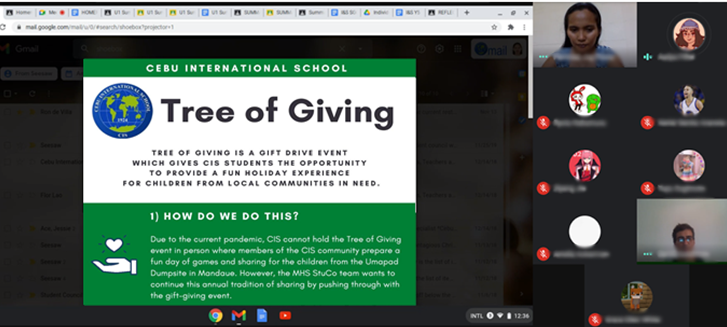
Grade 8 Homeroom “jamboard” activity as students share ideas on the ATL skill of collaboration.
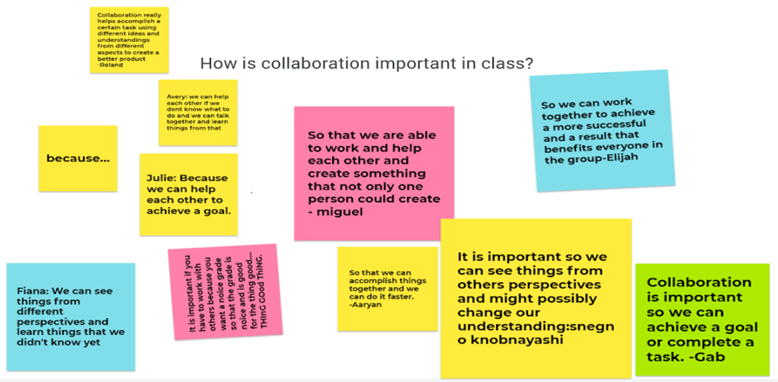
Grade 10 Maths
This year for the first time we have differentiated our Math classes in Grades 9 and 10 into “Core Math” and “Extended Math” to meet the distinct needs of students in each of these levels. The Extended group has created an opportunity for a unique challenge; the aim is to expose students to as wide a range of mathematical activity as possible and help them prepare for AA (Analysis and Approaches) Math in the DP when they reach Grade 11.
The Grade 10 Extended class began the semester with the abstract concept of Complex Numbers, studying their algebra and then looking at the Argand diagram (Complex plane) as a means of representation. The second unit of the semester was Trigonometry, we have considered this topic from both theoretical and practical viewpoints: as periodic, circular functions and as tools for surveying and navigation.
The final assessment for the semester which students are currently working on is a project where students have been asked to model the time of the sunrise over a period of one year. This was an opportunity for students to apply trigonometric theory to a real-life situation. It also mirrored a similar exercise which will be required as coursework for the IB Diploma, so it is stretching them and preparing them to be ready for challenges yet to come.
Model United Nations challenges students while developing relationships
Our Model United Nations (MUN) After School Activity (ASA) wonderfully demonstrates the connection between trust and challenge; this activity challenges students to grow cognitively and expand their understanding of the world around them while building relationships with their coaches and peers and also honing valuable research, communication, and collaboration skills.
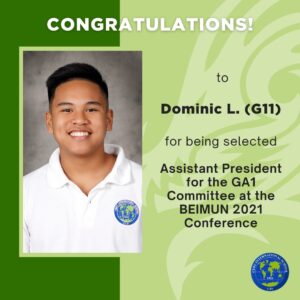 Over the past few weeks, students in the after school Model United Nations ASA have been exploring new topics and sharing this new information with each other. The areas they are investigating are based on the topics that will be explored in February’s BEIMUN Conference, hosted by the International School of Beijing. While the upcoming conference, held February 25-28, 2021, will not be something we can attend in person, we are pleased to have a contingent of Cebu International School students who will participate virtually.
Over the past few weeks, students in the after school Model United Nations ASA have been exploring new topics and sharing this new information with each other. The areas they are investigating are based on the topics that will be explored in February’s BEIMUN Conference, hosted by the International School of Beijing. While the upcoming conference, held February 25-28, 2021, will not be something we can attend in person, we are pleased to have a contingent of Cebu International School students who will participate virtually.
Students have explored topics ranging from international money-laundering, the global waste crisis, systematic racism in the workplace, the weaponization of artificial intelligence, protecting whistleblowers, establishing a framework for emergency global health responses, and the militarization of outer space. Through their research, students have explored the background and causes of these issues, determining which key terms need to be understood for each, and have evaluated what countries are involved (and may represent differing perspectives) with each of these issues.
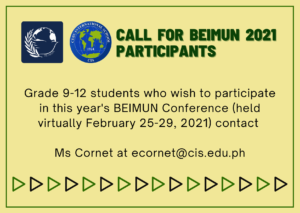 Our next preparatory step involves our students digging more deeply into the perspective of the country they have signed up to represent in the February BEIMUN Conference in order to fairly and accurately mirror that country’s perspective.
Our next preparatory step involves our students digging more deeply into the perspective of the country they have signed up to represent in the February BEIMUN Conference in order to fairly and accurately mirror that country’s perspective.
Here is what some of our student participants shared in reflection:
“A topic that I found interesting was the artificial intelligence race. Much like the militarisation of outer-space, I didn’t think it was something that would happen in real life.” – Sofia, G11
“I learned that the informal economy is most present in developing countries and that many countries still have not carried out necessary actions to ensure the welfare of these employees. One insight I also got was that the extent to which the informal economy is present in a country is a reflection of other societal determinants such as unemployment, poverty, and bureaucracy.” – Logan, G11
“The advanced research I have started will help me be better prepared and more knowledgeable about the issues that are currently happening. Moreover, it also allows me to learn more about the world and what international organizations plan to do about these issues.” – Dana, G12
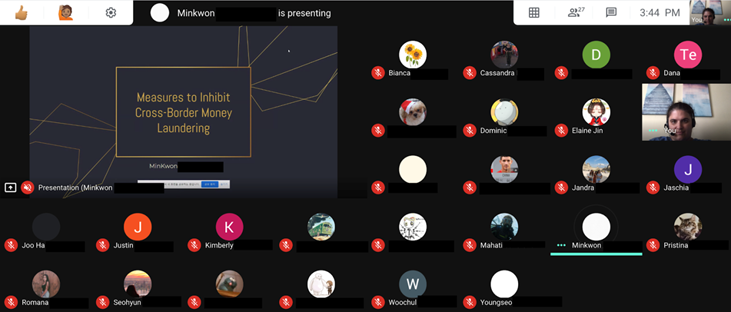
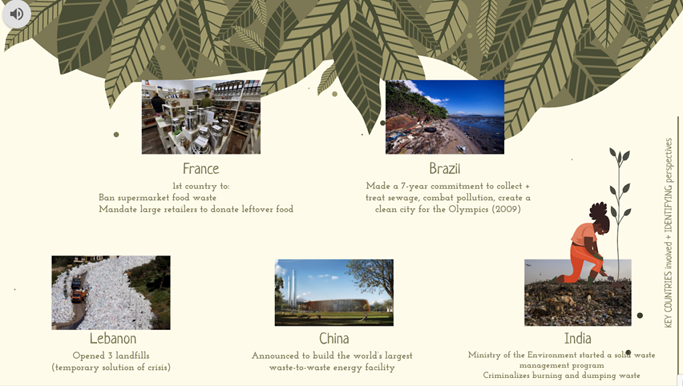
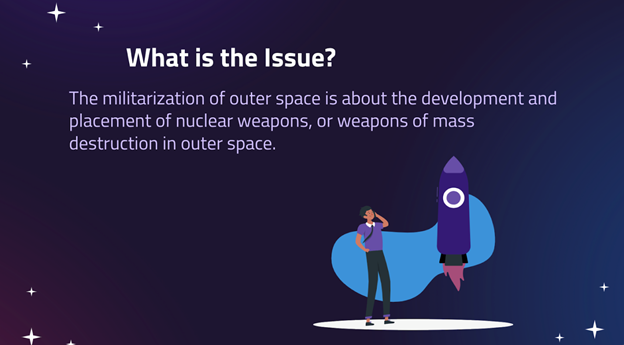
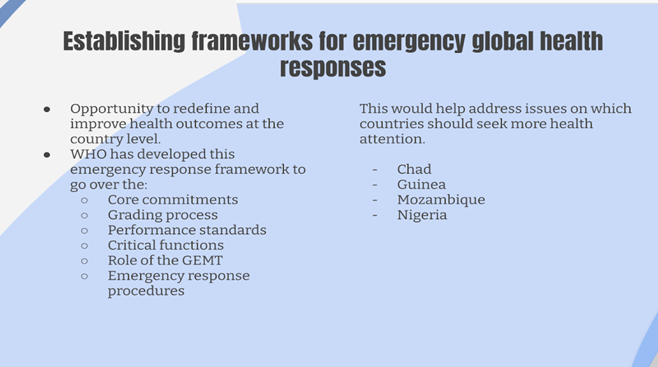
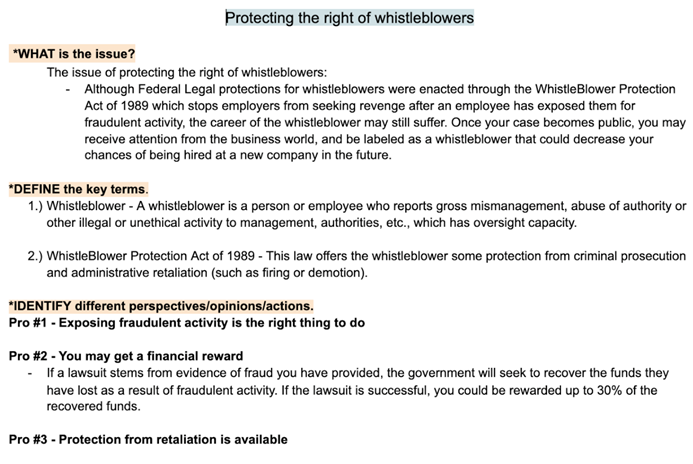
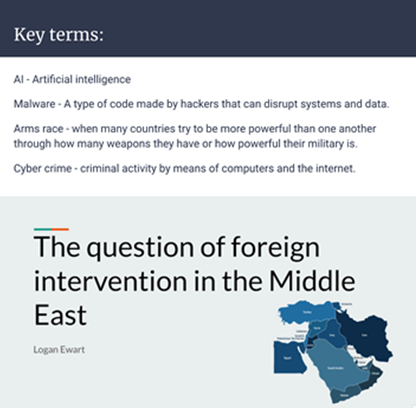
Tree of Giving
by MHS Student Council
Hi All!
Our annual Tree of Giving is coming up but due to current circumstances, the event cannot be held in person. However, the MHS Student Council will still push through with the gift-giving aspect of the event.
The MHS StuCo would like to encourage everyone to donate wrapped shoe boxes that contain personal care items and basic school supplies which will be given to those in need.
Thank you in advance! Your little help will go a long way, especially given that the children (and families) at the Umapad Dumpsite in Mandaue – our community beneficiary – have gone through really tough times through this pandemic and the recent floodings in Cebu.
All the best!
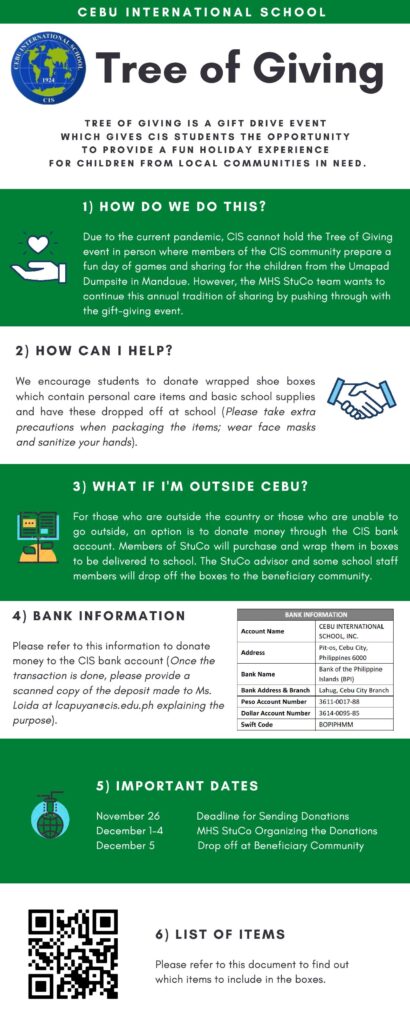

College/Careers Counselor Corner
by Ms. Jenny Basa, College/Careers Counselor
Tip for the Week:
The English Proficiency Requirement:
Most university websites have this on their list of requirements. How does an applicant fulfill this?
- A passing grade in English A: Language & Literature (HL or SL). Some universities will require a 3 or 4 and specify the level.
- A certificate from the school indicating English as the medium of instruction & assessment.
- A certificate from the school indicating accreditation with Western Association of Schools and Colleges (WASC) and Council of International Schools (CIS)
Some students take the TOEFL or the IELTS. This is an additional item one can submit but it is not required unless the university specifically states that it is required for a specific course or purpose. A specific course that requires the English language test is a medically allied course such as nursing which will involve working in a clinical setting in the community.
Upcoming Virtual Events and Fairs: (students & parents are welcome)
DATE
November 24 – Tuesday
2:30 PM
November 25
Wednesday
1:30 – 5:00 PM
EVENT
National University of Singapore (Singapore)
Link to follow
Virtual University Fair (Australia & New Zealand)
Link to Register
Attending Institutions: Lincoln University (NZ), Macquarie University (AU), University of Adelaide (AU), University of Auckland (NZ), University of Canterbury (NZ), University of Melbourne (AU), University of New South Wales (AU), University of Queensland (AU), University of Sydney (AU), University of Western Australia (AU)
November 27
Friday
1:30 – 5:00 PM
Virtual University Fair (Canada, UK and Ireland)
Link to Follow
Participating institutions: (Canada) Cape Breton University, McEwan University, Mount Royal University, Ontario Tech University, University of Winnipeg – (UK/Ireland) Leeds Beckett University, Nottingham Trent University, University of Portsmouth, Swansea University, University of Leeds, University of Southwales
SAT Update
Please note that most universities have gone test-optional. This means they do not require test scores for students to be eligible for admission.
November 7 and December 5 have been cancelled by the College Board. Test-takers registered on these dates will receive an email with instructions.
| 2020-2021 Test Dates | Test | Registration Deadline |
| December 5, 2020 | CANCELLED | |
| March 13, 2021 | SAT only (no Subject tests) | February 12, 2021 |
| May 8, 2021 | SAT & SAT Subject Tests | April 8, 2021 |
| June 5, 2021 | SAT & SAT Subject Tests | May 6, 2021 |
To register for the SAT, you may click on this link. If you need assistance or have any questions, please feel free to email Ms. Jenny Basa at jbasa@cis.edu.ph.



